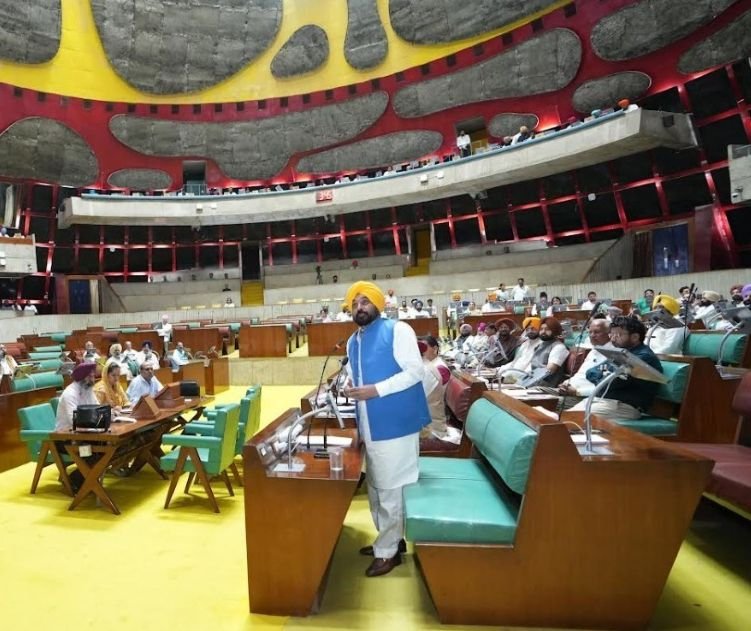In a move that underscores the gravity of faith-based harmony in Punjab, Chief Minister Bhagwant Singh Mann on Monday introduced the Punjab Prevention of Crime Against Religious Scriptures Bill, 2025 in the Vidhan Sabha, sending a strong message of zero tolerance toward sacrilege. Framing the legislation as a moral and generational imperative, the Chief Minister declared that his government remains unwavering in its duty to uphold the sanctity of religious scriptures and the spiritual heritage of the state. The bill is being positioned not only as a statutory tool but as a collective voice of Punjab’s conscience against those who attempt to tear apart its secular and cultural fabric.
Presenting the bill on the House floor, Mann described sacrilege not merely as a crime against law but as a deep affront to human civilization, calling it “unpardonable.” He said the new legislation has been designed to ensure that individuals who commit such acts face the sternest possible punishment. According to the Chief Minister, the drafting of the bill was preceded by consultations with some of the most respected legal minds in the country to build a framework that can withstand judicial scrutiny while delivering swift and exemplary justice. He stressed that it is imperative to create a strong deterrent that sends a clear signal to elements attempting to provoke communal unrest or destabilize the peace Punjab has fought hard to maintain.
Mann emphasized that Punjab is no ordinary region—it is the land sanctified by the teachings of Guru Nanak Dev Ji and countless saints, sages, and spiritual leaders who taught humanity the values of compassion, brotherhood, and mutual respect. Yet, in recent years, particularly since 2016, anti-social forces have sought to polarize communities and create discord through systematic and provocative acts of sacrilege. Incidents like Bargari and Behbal Kalan remain etched in the public memory as moments of anguish and betrayal, and Mann made it clear that his government will no longer allow such wounds to be inflicted upon Punjab’s collective soul.
He reaffirmed that every person—whether directly involved or complicit—will be brought to justice under the new bill, which is expected to become a milestone in the legal and political response to sacrilege. The bill’s framework includes strict penal provisions and special investigative mechanisms that empower authorities to act decisively and transparently. The legislative effort, Mann said, is a reflection of the aspirations of every Punjabi who believes that spirituality, irrespective of religion, must be preserved as a cornerstone of the state’s identity.
Addressing reporters outside the Assembly, the Chief Minister took direct aim at the Congress party for what he called a “shameful lack of urgency” on a matter that affects every household in Punjab. He noted that Congress leaders asked for more time to deliberate on the bill, a request Mann interpreted as a strategic delay tactic that exposes their lack of emotional and moral investment in the issue. He reminded them that the pain of sacrilege is still raw for thousands of families, and that the people of Punjab expect their elected representatives to rise above party lines when it comes to safeguarding religious dignity.
Expressing hope that the bill will be passed unanimously when discussions resume on Tuesday, Mann called on all political parties to unite in support of the legislation. He insisted that politics must take a backseat when the very foundations of Punjab’s harmony are at stake. “Let history not record who delayed justice, but who delivered it,” Mann remarked passionately, reflecting the mood of a society that demands accountability for past wrongs and protection from future provocations.
As Punjab moves toward passing this landmark legislation, the global Sikh diaspora and other interfaith communities have begun to take notice. With the bill, Punjab may well set a precedent for other Indian states—and even nations—on how to legally and morally safeguard religious texts and symbols from targeted desecration. If enacted and implemented rigorously, the Punjab Prevention of Crime Against Religious Scriptures Bill, 2025 could become a defining moment in the state’s post-independence legislative history, placing spiritual dignity above political compromise.
#PunjabAssembly #BhagwantMann #SacrilegeLaw #ReligiousHarmony #PunjabPolitics #FaithProtection #BargariJustice #SacredTexts #IndianLegislation #HumanRightsLaw
This is auto web generated news web story.
